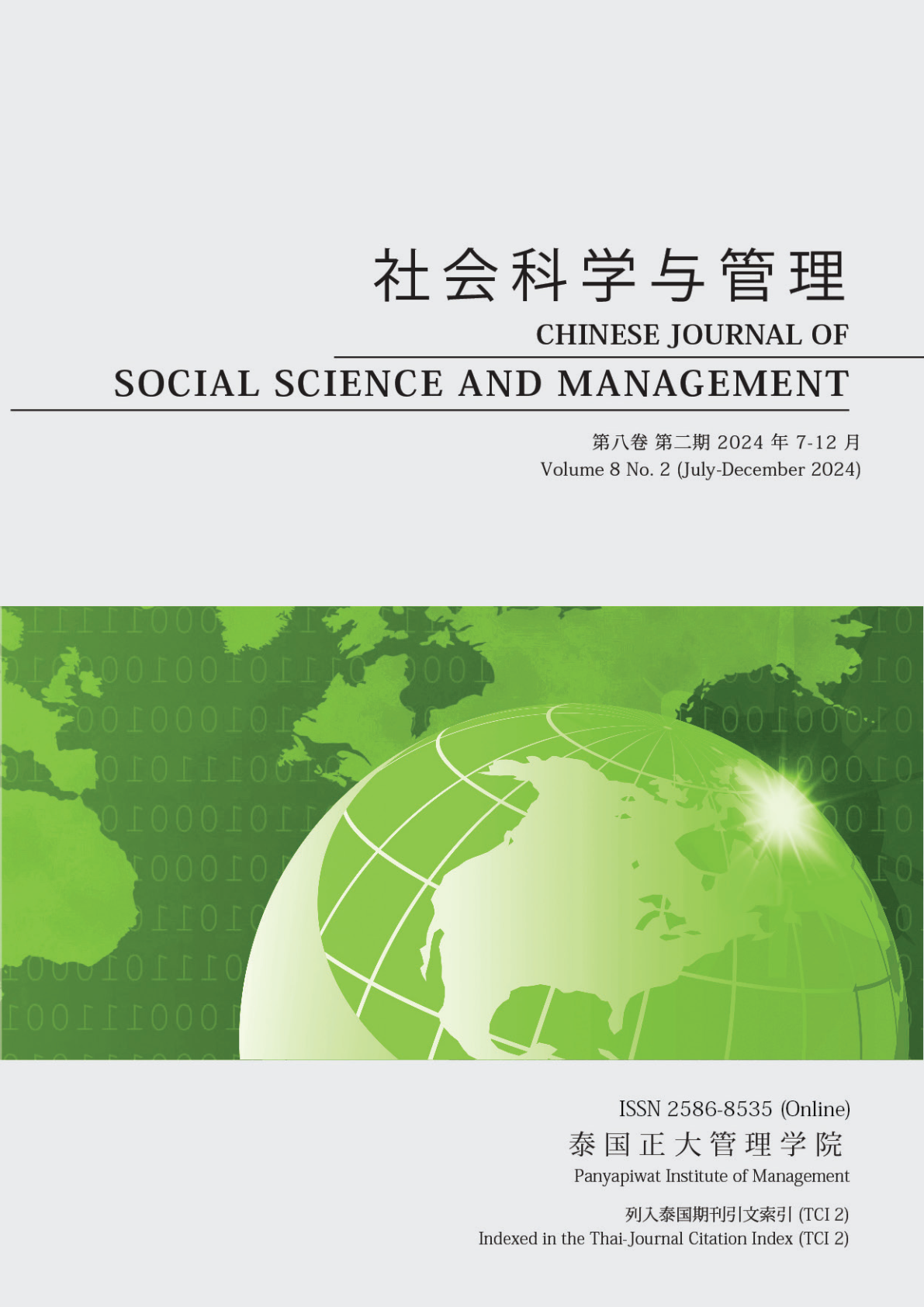THE IMPACT MECHANISM AND MODEL CONSTRUCTION OF FAMILY BUSINESS TRANSFORMATION IN GUANGDONG-HONG KONG-MACAO BAY AREA
Main Article Content
Abstract
This paper mainly analyzes the mechanism of the factors influencing the transition behavior of family enterprises in the Guangdong-Hong Kong-Macao Bay area, and puts forward relevant research hypotheses. Firstly, the paper explains the connotations of the goal of family business transformation in the Guangdong-Hong Kong-Macao Bay area, and expounds that the essence of family business transformation in this area is comprehensive transformation development. Secondly, the paper deconstructs the influencing factors of the family business transformation behavior in the Guangdong-Hong Kong-Macao Bay area. On this basis, the paper analyzes the mechanism of the factors influencing the transformation behavior of family enterprises in this area, which indicates that the transition capability promotes the emergence of transition behavior and that the degree of transition can adjust the transition behavior according to the strength of the transition capability.
Article Details

This work is licensed under a Creative Commons Attribution-NonCommercial-NoDerivatives 4.0 International License.
Chinese Journal of Social Science and Management Editorial Division
The Office of Research and Development, Panyapiwat Institute of Management
85/1 Moo 2, Chaengwattana Rd., Bang Talat, Pakkred, Nonthaburi 11120, Thailand
Tel. 02 855 01048 E-mail: cjssm@pim.ac.th
References
Astrachan, J. H., & Shanker, M. C. (2003). Family businesses’ contribution to the U.S. economy: A closer look. Family Business Review, 16(3), 211-219.
Brynjolfsson, E., & Hitt, L. M. (2000). Beyond computation: Information technology, organizational transformation and business performance. Journal of Economic Perspectives, 14(4), 23-48.
Chu, X. P., & Li, H. Z. (2003). Trust and the growth of the family businesses. Manage World, (6), 98-104. https://doi.org/10.19744/j.cnki.11-1235/f.2003.06.012
Deng, S. J., & Rui, M. J. (2010). Frontier analysis and future prospect of micro-cognitive mechanism of tissue dynamic ability evolution. Foreign Economy and Management, (11), 26-34. https://doi.org/10.16538/j.cnki.fem.2010.11.005
Donnelley, R. G. (1988). The family business. Family Business Review, 1(4), 427-445. https://doi.org/10.1111/j.1741-6248.1988.00427.x
Gong, T. P., & Dou, Y. J. (2007). Research progress on the relationship between corporate ethics and economic performance in the West. Social Sciences Abroad, 6, 36-42.
Han, Z. X., & Gao, X. Y. (2022). Family business diversification, family governance and technological innovation. CNKI. https://kns.cnki.net/kcms/detail/detail.aspx?FileName=XuXI20220715001&DbName=DKFX2022
Hung, R. Y. Y., Yang, B. Y., Lien, B. Y. H., Mclean, G. N., & Kuo, Y. M. (2010). Dynamic capability: Impact of process alignment and organizational learning culture on performance. Journal of World Business, 45(3), 285-294.
Li, Y. S., Li X., Zhu, N., & Yu, Y. J. (2022). Analysis of the influence mechanism of entrepreneurship driving the regional transformation of family enterprises. Accounting Monthly, (4), 119-127. https://doi.org/10.19641/j.cnki.42-1290/f.2022.04.017
Li, Y., Zhu, Q. Y., & Liang, J. R. (2001). Discussion on the theory of corporate strategy transfer. Economic Management, 6, 29-35.
Liang, Q., Zou, L. K., & Zhang, M. H. (2022). Family business time view: Long-term oriented to the latest research progress and foresight. Journal of Management, (3), 103-121. https://doi.org/10.19808/j.cnki.41-1408/f.2022.0029
Liu, X. X. (2000). The influence of ownership structure of Chinese industrial enterprises on efficiency difference empirical analysis of —— 1995 National Industrial Enterprise Census data. Economic Research, (2), 17-25. [in Chinese]
Liu, S. L. (2008). Corporate ethics is the key to the core competitiveness of enterprises. Mall Modernization, 1, 133-134.
Lu, F. C., & Liu, M. Z. (2004). The growth model and Its choice of family enterprises in China. China Rural Observation, (3), 58-64, 81.
Ma, L., & An, L. R. (2015). Review and prospect on motivation of knowledge cooperation among enterprises. East China Economic Management, 29(10), 152-160.
Mao, Y. Z., Zheng, Y. Z., & Ye, Z. X. (2016). Stage selection of upgrades from ODM to OBM. Technical Economics and Management Research, (2), 45-51.
Qu, J. Y., Zhang, C. Q., & Shi, Y. T. (2015). A study on the impact of Internet entrepreneurship education on college students’ early Internet entrepreneurship behavior. Technology and Management, 17(6), 108-114.
Sun, Z. B. (1995). Familism and modern Taiwanese businesses. Sociological Studies, (5), 56-65. https://doi.org/10.19934/j.cnki.shxyj.05.010 [in Chinese]
Tang, J., & Jiang, Y. F. (2008). Conceptual development and empirical test of entrepreneurial capability. Economic Management, 9, 51-55.
Wilden, R., Devinney, T. M., & Dowling, G. R. (2016). The architecture of dynamic capability research identifying the building blocks of a configurational approach. Academy of Management Annals, 10(1), 997-1076.
Wu, J. X. (2015). Rethinking the connotation of innovation and its enlightenment. Learning and Exploration, 4, 123-127.
Wu, J. X., & Li, H. R. (2009). Investigation report on transformation and upgrading of small and medium-sized enterprises in Zhejiang Province. Managing the World, 8, 1-5.
Xie, K., Wu, Y., & Xiao, J. H. (2016). Strategic risk control in organizational change: A multi-case study based on enterprise internet transformation. Managing the World, 2, 133-148.
Ye, G. C. (2004). On the life cycle and its extension of private enterprises. Economic Issues, (1), 44-46. https://doi.org/10.16011/j.cnki.jjwt.2004.01.016 [in Chinese]
Zhang, Y. H., & Gan, D. A. (2003). Theoretical mode and current situation analysis of the development process of family enterprise. Hubei Social Science, (8), 83-84.
Zhang, H. Z., & Feng, X. G. (2013). Research on the countermeasures of improving China’s science and technology innovation capability based on endogenous growth perspective. Modern Management Science, 4, 27-29.
Zhang, J. Y. (2008). A study on the formation path and transformation mechanism of firm executive power based on disruptive innovation [Doctoral dissertation]. Tianjin University of Finance and Economics.
Zhou, L. X., & Chen, J. J. (2020). The influence of the psychological ownership of the family members on the entrepreneurial orientation of the family business. Journal of Chongqing University (Social Science Edition), (5), 71-82.


